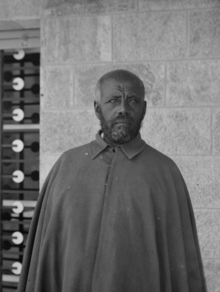Kassa Haile Darge
|
Leul Ras Kassa Hailu KS, GCVO, GBE |
|
|---|---|
 |
|
| President of the Crown Council of Ethiopia | |
|
In office 13 July 1941 – 16 November 1956 |
|
| Monarch | Haile Selassie I |
| Personal details | |
| Born |
8 July 1881 Selale, Ethiopia |
| Died | 16 November 1956 (aged 75) Addis Ababa |
| Resting place | Debre Libanos |
| Spouse(s) | Tsige Mariam Beshah |
| Children |
Aberra Kassa Asfawossen Kassa Wondosson Kassa Asrate Kassa Bizunesh Kassa Manayalush Kassa Tessemia Kassa |
| Religion | Ethiopian Orthodox |
Leul Ras Kassa Hailu KS, GCVO, GBE, (Amharic: ካሣ ኀይሉ ዳርጌ; 7 August 1881 – 16 November 1956) was a Shewan nobleman, the son of Haile Wolde Kiros of Lasta and Tisseme Darge, and grandson of Ras Darge Sahle Selassie the brother of Menelik II's father.
John Spencer, who advised Ras Kassa during the writing of the 1955 Constitution of Ethiopia, described him as "surely the most conservative of all the rases in constant attendance at the court." Spencer continued his description of the aristocrat by noting that he rarely saw the Ras "in other than Ethiopian national dress. Large, bearded and silent, this imposing dignitary wore a black cloak with gold clasps worked into the form of lion heads. In working sessions, he used to take out with considerable pride a pair of folding half-lens spectacles with gold frames and bows."
Although he had by birth a better claim to the throne than his younger cousin Ras Tafari (the later Emperor Haile Selassie I), Kassa valued loyalty over ambition, and was content with his fief of Selale province near the monastery of Debre Libanos. During the rise of Emperor Haile Selassie I, Ras Kassa was loyal to Selassie during numerous challenges to his rule, standing by his side during more than one uprising. His most notable act supporting Haile Selassie was his role in neutralizing the threat of Dajazmach Balcha Safo in 1928.
Ras Kassa served as ("Commander of the Army of the Right") during the Second Italo-Abyssinian War. His forces fought in the First Battle of Tembien and the Second Battle of Tembien. Following the Ethiopian defeat he went into exile with his Emperor, spending most of his time in Jerusalem.
...
Wikipedia
